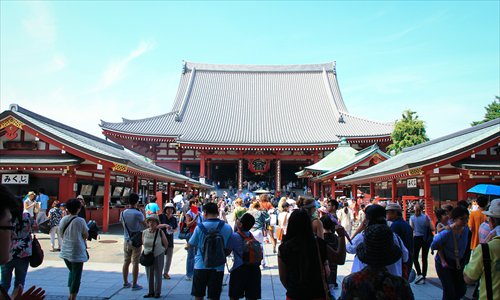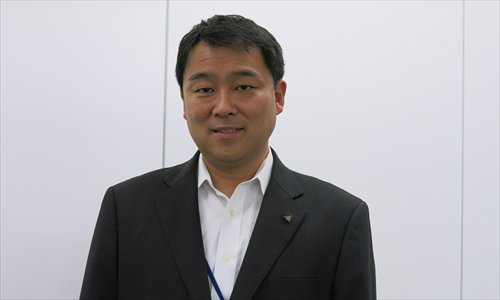Neighborly relations
By Catherine Wong Tsoi-lai in Tokyo Source:Global Times Published: 2015-8-6 20:43:01
JCFA working to establish friendlier Sino-Japanese ties

The Sensoji Temple in Tokyo, Japan Photo: Guo Zhimin/GT
"Just as everyone is curious to know everything that is going on with their neighbors, the Japanese are actually very interested in China," Tokuichiro Utsunomiya, vice president of the Japan-China Friendship Association (JCFA), told the Global Times.
"Even though sometimes their attention is focused on more negative aspects," he added.
New beginnings
The JCFA was founded in 1950 with the goal of forging friendlier ties with China, one of Japan's closest neighbors. Since then it has become one of the biggest and oldest such groups in Japan.
Since its inception it has stood witness to the continued development of relations between the two countries - from neighbors that barely talked after WWII to the normalization of relations in 1972 and on through the two's more recent rocky relationship.
Utsunomiya, 47, became the association's youngest vice president ever when he took over the position in 2014. "I want to carry on the torch and continue to fight for the dreams of my grandfather," he said.
Utsunomiya's grandfather, Tokuma Utsunomiya, was a renowned politician and legislator in Japan known for advocating disarmament and the normalization of Sino-Japanese diplomatic relations as part of a dissident group within the Liberal Democratic Party.
Relations between the two countries remained tense after the end of the WWII. In fact, it wasn't until the signing of a joint statement in 1972 during then Japanese Prime Minister Kakuei Tanaka's visit to China that the two countries resume diplomatic exchanges.
"Economic exchanges were a priority at the time," Tokuichiro Utsunomiya said.
Back then, what was dubbed "Ping-pong diplomacy" played a role in improving relations between the two neighbors.
"In 1972, Chinese table tennis players participated in a tournament in Japan for the first time," Utsunomiya said.
"The Japanese people were impressed by the Chinese players' performance. This helped lay a foundation upon which better relations could be established," he noted.

Tokuichiro Utsunomiya Photo: Li Qian/GT
Changing relationship
Forty-three years after the normalization of relations, China and Japan have become closely tied economically. Today, China is Japan's second-largest export market.
In 2014, a record 2.4 million Chinese visited Japan, a year-on-year increase of 83 percent.
On the streets of Tokyo, signs in Simplified Chinese are seen at shop entrances, while Chinese-speaking employees can be found in almost every drugstore and grocery store assisting Chinese customers to purchase beauty products and electronic goods.
In recent years, the Japanese media has coined the phrase "bakugai," which roughly translates to "explosive buying," to describe the influx of Chinese shoppers.
This rosy picture in the business sector, however, has not translated into better political and social relations between the two countries.
An annual opinion poll conducted by Japanese nongovernmental organization Genron and a Beijing-based English-language newspaper in 2014 shows that 93 percent of 1,000 Japanese respondents said their impression of China was "unfavorable," up from 90.1 percent in 2013 and the highest percentage since the survey began in 2005.
On the other hand, the percentage of Chinese who have an unfavorable impression of Japan stood at 86.8 percent, down from 2013's 92.8 percent.
Besides conflicts over sovereignty claims over the Diaoyu Islands, conflicts over historical issues and military policies have also cast shadows over the two Asian powers' relations.
In its latest move, the Japanese government has once again begun hyping up the "China threat" to justify the need to shift its military policy.
On the other hand, in a separate poll of Japanese citizens released by Kyodo News in July, more than 70 percent of respondents said Japan should make an effort to improve relations with China.
A sign of Japan's intense interest in understanding China, in Tokyo's major bookstore chains the sections for books discussing China are far larger than sections about other countries, such as the US and South Korea.
These books cover a time period from ancient times to the modern era as well as a wide range of topics from the Japanese translations of traditional Chinese literature to analyses on China's politics and economy.
However, books talking about the "dark side" of China are more common as they tend to capture more attention and sell better.
Utsunomiya believes that this reflects Japan's conflicting sentiments toward China.
"Since ancient times Japanese have been fond of learning about Chinese culture and institutions," he said. "They still have this interest today, but are now interested in the wrong areas due to increasingly poor bilateral relations in recent years and also because of the inaccurate portrayal of China by some Japanese media outlets."
In Utsunomiya's opinion, younger Japanese people's ignorance of the historical relationship between the two countries, especially after the Meiji period until the end of WWII, have contributed to a lack of understanding and hence dislike of China.
Younger demographic
Currently Utsunomiya is facing a more imminent crisis - a lack of successors to carry on the JCFA's goals.
"To be honest, we do not receive much pressure from conservative political groups anymore as we are too low-key to be a target," Utsunomiya said.
Most of JCFA's current membership consists of people over 50, making Utsunomiya worry that the association may not be able to go on in another 10 years. For this reason, the association has been actively reaching out to and recruiting younger Japanese who have studied or spent time in China.
In mid-May, the association organized 100 students and 150 Japanese citizens on a trip to Nanjing, the site of the Nanjing Massacre (1937-38). While there the group worked to restore the original Nanjing city walls that were destroyed during Japan's invasion of China.
"Before the trip, many students and their parents were worried that Chinese people would have anti-Japanese sentiments. But this worry was dispelled when they realized that China is a friendly country," said Utsunomiya.
"These participants' impression of China would have been entirely different had they never visited," he said. "By experiencing the real China, they will become ambassadors and spread their stories to their friends and family members."
Posted in: Miscellany, Asia in Focus